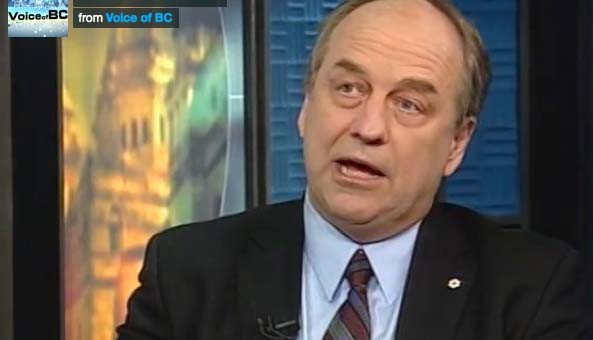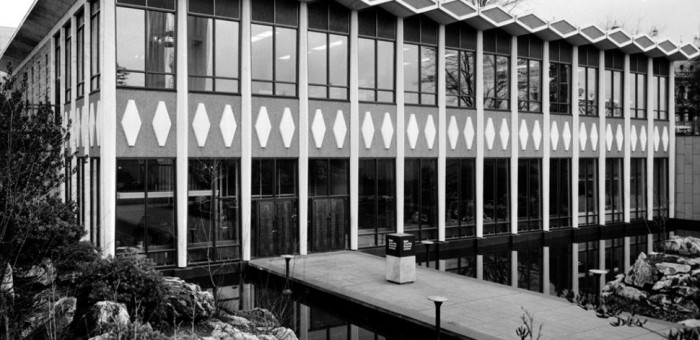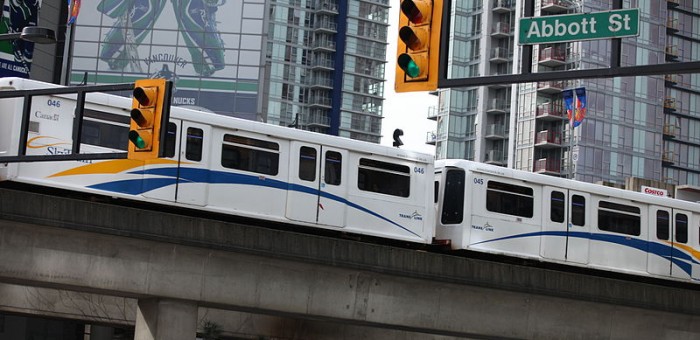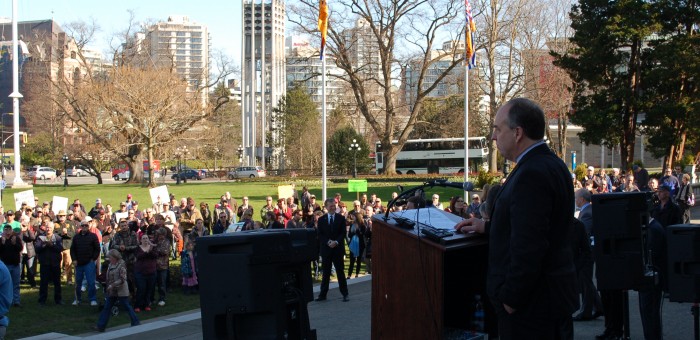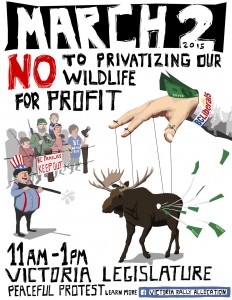Uncategorized
Voice of BC with Guest Host Keith Baldrey
On Thursday April 2, 2015, Adam Olsen and I were on Voice of BC with guest host Keith Baldrey. We discussed a number of issues including MSP Premiums, BC’s Treaty Commission, Vancouver’s Transit referndum, BC’s controversial wolf cull, the Kinder Morgan pipeline proposal and more.
Let’s Take Politics out of Minimum Wage Policy
Earlier today the BC government announced that they would be increasing the minimum wage by $0.20 and implementing a process to further increase it every September, based on increases to B.C.’s Consumer Price Index (CPI).
While I am sure we can all agree that minimum wage needs to increase and that tying it to the CPI is a good thing, in my view, this announcement is merely the latest iteration of a highly politicized process for determining increases to the minimum wage.
I think it’s time we changed the way minimum wage is determined. We need to get politics out of the process as much as possible. This isn’t wishful thinking – we only have to look at the steps Ontario is taking to develop a better way forward.
In June of 2013, the Ontario government struck a Minimum Wage Advisory Panel to examine Ontario’s minimum wage policy and provide advice on an approach for determining minimum wages in the future. The panel was made up of two business representatives, one organized labour representative, one non-union employee representative and one youth representative. They engaged in a wide sweeping consultation with Ontarians from all sectors of the economy. They held town halls in ten cities, and accepted submissions online, through mail and on their website.
This process culminated in the January 2014 release of the Minimum Wage Advisory Panel Report and Recommendations to the Minister of Labour.
This is a substantial document and I encourage anyone interested in this topic to give it a read. It is very thorough provides the reader with the research and debates surrounding minimum wage policy. It is not an ideological document, but rather willingly highlights controversial issues and the need for further study.
What is important to note right away is that the public feedback the panel received contained a “near universal agreement on making the process of revising minimum wages more transparent, predictable, fair and arms-length from government’s own near-term concerns.”
This was missing from today’s announcement about the B.C. increase — it was yet another political move that wasn’t actually addressing the full extent of the problem. Annual increases tied to inflation will only ensure minimum wage doesn’t fall further behind, rather than asking whether it still has some catching up to do before indexing minimum wage to the B.C. Consumer Price Index.
The Ontario Panel wasn’t tasked with determining if the minimum wage should go up, or what the baseline value should be, but rather to advise how a process could be developed that would address multiply stakeholders concerns. For business, predictability and gradual increases (as opposed to big increases all at once) are important; for labour and those employed at the minimum wage, it’s critical that a process be established that would protect them from falling behind while ensuring careful consideration was being taken to set a rate that improved quality of life.
The fact is, changes to the minimum wage can have wide spread, and not always obvious impacts on the economy. This report does an excellent job of canvassing the research on the economic impact of minimum wages on a variety of factors, including wage distribution, low-wage workers, education and poverty. Almost universally, the research available about the impacts of minimum wage increases is not overwhelmingly positive or overwhelmingly negative, but instead suggests the need for careful and considered policy, rather than using the minimum wage to accomplish political ends.
This is particularly true when it comes to using minimum wage policy to fight poverty. For this purpose, minimum wage is a very blunt tool.
For starters, the demographics of people earning minimum wage limits its effectiveness as a measure to fight against poverty. A large number of those earning minimum wage are in fact students, many who are still living at home with their parents. Furthermore, the report points out that many minimum wage jobs are often taken as stepping stones to higher paying jobs.
This is not to suggest that minimum wage policy has no role to play in fighting poverty. Rather minimum wage is just one of a suite of policies that could and should be advanced, including housing first, skills training and taxation reform, etc. As the panel noted:
“Any linkage between the minimum wage and poverty needs to be situated within the context of various other measures to address poverty…”
It is also important that we don’t limit the description of poverty to those earning the minimum wage. There is a large gap between the minimum wage in British Columbia and the living wage – that is the minimum wage needed to ensure you are meeting your basic needs. We need to ensure that we are providing the supports for people throughout this range of incomes.
The report from the Minimum Wage Advisory Panel concludes with 4 key recommendations:
Recommendation #1: Minimum wages should be revised annually by a percentage equal to the percent change in the Ontario Consumer Price Index.
Recommendation #2: Minimum wages should be revised annually, and a minimum four months’ notice of any wage change should be provided. The effective date of minimum wage changes should be April 1 of the following year. This would result in notification by December 1 of the previous year.
Recommendation #3: The Government should undertake a full review of the minimum wage rate and the revision process every five years. This review should be conducted by a panel of stakeholders and a neutral chair. The mandate of this Panel would be to review Ontario’s past experience with minimum wage revisions within the context of Ontario’s social and economic progress and prevailing practices in other jurisdictions to recommend changes that could better serve Ontario’s future needs.
Recommendation #4: To aid the full review process, and to ensure that Ontario’s minimum wage policies are in step with the needs of it’s citizens, the Government should establish an ongoing research program for data and information gathering its subsequent analysis to address policy-relevant minimum wage issues.
Some of these recommendations will look similar to today’s announcement in British Columbia – and indeed there are flashes of good policy in what the British Columbia government has proposed. Committing to an annual increase to the minimum wage tied to the British Columbia CPI is exactly what was recommended in Ontario. However the policy in British Columbia remains incomplete until we properly de-politicize it. That will take a commitment from the government to empower a properly independent panel to conduct the necessary consultations to determine what the appropriate minimum wage level is, and how future increases will be achieved and reviewed as time moves forward.
At the end of the day, my own view is that the minimum wage is certainly too low. However, I wouldn’t be able to point to a specific number that I believe is the “right” place for a minimum wage. We need an independent, non partisan British Columbia panel to conduct an exercise similar to what was done in Ontario, but expand its mandate to recommend a new minimum wage that puts the needs of British Columbians first.
Rather than pulling a number out of a hat, advancing clear, evidence-based policy on minimum wage that is arms-length from government would end the cycle of putting politics first, and instead start making working people the top priority.
Bill 5 — Government Information Act
On Tuesday I rose to speak at second reading on Bill 5 – Government Information Act.
Bill 5 would create new digital archives and eventually make it mandatory for ministries to keep most records electronically. These digital archives will be open to the public and searchable online. The legislation also creates a new chief records officer position, responsible for overseeing retention, digitization and archiving of government information. This position would oversee the transition from the current paper-based archiving system to the new digital platform – proposed to begin this spring and last about three years.
It is argued that digital archives will better preserve the province’s heritage while allowing people to search and retrieve historical information from anywhere in the world.
If approved, this new legislation will replace the Document Disposal Act, which was enacted in 1936 and viewed as out of date.
Below is the text of my contribution to the debate.
My contribution to the debate at second reading
This bill before us, in my view, is a step in the right direction for how we manage government records in British Columbia. I do understand that the member for Nanaimo–North Cowichan does plan to, either himself or someone else from the official opposition, introduce duty-to-document legislation. I recognize that’s not the discussion of this bill here, but I believe that that is an important step to be coupled in with this legislation as it is brought into this chamber.
It is important not only to document digitally but have a duty to do such documentation. So in this regard, I very much look forward to seeing the official opposition’s bill in this area.
Elizabeth Denham, the Information and Privacy Commissioner for B.C., has written a rather detailed letter concerning recommendations for this bill. I find her comments on this legislation to be a rather huge public service, things that I truly believe are important to reflect upon as they help shine light on the best practices concerning government information.
Before I highlight some of her recommendations, perhaps I could read a couple of sentences from her introduction in the letter. This what she said:
“Information rights are of vital importance to citizens. Access to government information and to an individual’s own personal information are essential elements of a transparent and accountable democracy. The rights of citizens to control and access information and records is regulated by a carefully balanced legal framework that guarantees these rights, subject only to narrow statutory exceptions.”
These are profound words, profound words that I think we should reflect upon as we move to committee stage. The passage is critical because it frames how we must approach any legislation that impacts government information — that is to say, with an eye to ensuring transparency and accountability.
In general, I’ll have two broad areas of inquiry that I hope to explore in committee stage. The first of these is the question: why does this bill not firmly establish independent oversight for the information management systems? The second: why does it not address the massive backlog in records that currently exists?
I think that if the purpose of this bill is to update how government manages records and information, ensuring that their approach is modernized, then both of these issues will be critical to address as we move forward. Government records, whether of historical value or information sought through information requests, should be managed under the eye of an independent office that can ensure that the principles of transparency and accountability are protected.
I look forward to committee stage and further deliberations on this bill in the days ahead
Bill 2 — BC Transportation Financing Authority Transit Assets and Liabilities Act
On Monday I rose to speak at second reading in support of Bill 2-2015 BC Transportation Financing Authority Transit Assets and Liabilities Act.
Currently in Vancouver, the rapid transit assets owned by the province are split between three crown corporations.
- The Expo Line and the West Coast Express is held by B.C. Transit
- The Millennium Line is held by Rapid Transit Project 2000 Ltd.
- The Evergreen line is held by B.C. Transportation Financing Authority
Bill 2 would consolidate all these assets under the BC Transportation Financing Authority while maintaining the level of service. This would allow for streamlining, cost saving and better management. While this bill helps to cut down on bureaucratic clutter, it does not deal with the larger issues facing transit in Metro Vancouver.
Below is the text of my contribution to the debate.
My contribution to the debate at second reading
I rise to speak just briefly at second reading of this bill to outline an issue that I think may have been overlooked over this bill. As the bill notes, there are currently…. These rapid transit assets owned by the province are split amongst three Crown corporations in the area: Expo Line and the West Coast Express held by B.C. Transit, the Millennium Line held by Rapid Transit Project 2000 Ltd. and the Evergreen line held by B.C. Transportation Financing Authority. Bill 2 would consolidate these into one entity while maintaining the level of service.
Now, it’s hard to argue that consolidation of assets spread around three is not actually a good thing. It would streamline administration, provide cost savings and, presumably, better management of the whole system at all. These assets, of course, would be transferred into and operated by TransLink.
Cutting down the bureaucratic clutter in the region of Metro Vancouver, I would argue, is a good thing. Nobody quite knows who is on second base at times or first base at times with the plethora of these Crown corporations with their different jurisdictions.
But here is the problem. TransLink has lost the support of the public. Nowhere is this more true than seeing the discussions happening with respect to the upcoming plebiscite in Vancouver.
This no longer becoming a question of: should Vancouver have transport or not? This is not a question of: is the PST increase a means and ways of funding the transit improvements in Vancouver? What’s happening in Vancouver is that this plebiscite is becoming a plebiscite on TransLink, and that is most unfortunate.
That’s most unfortunate because here in this bill we have bringing together assets into a Crown corporation that has lost the public trust. In doing so, the public will question the rationale behind this. The public will question whether or not bringing in TransLink is the right thing to do. The public will question whether or not this is actually going to improve service.
Accountability is the keystone — and was the keystone — of the original vision of TransLink. It was envisioned as a regional authority to be run by a local and elected board. But now, of course, it’s no longer the case. We have an appointed board. We have an appointed board which is not accountable to the voters. The council of mayors, which makes recommendations and have to live with the consequences of decisions being made, is elected. But they don’t actually have the control over the process and decision-making.
This bill is bringing more assets into an organization, TransLink, a Crown corporation that will have more control and more voice over what the mayors must implement, at the same time as it’s losing the confidence of the general public. In order to deal with the root cause, the root problem, that exists — that is, the lack of public support for TransLink — we’ll need to explore, in committee stage, how the government plans to actually assure us that as it brings more and more assets into the Crown corporation for transit, it does so in means and ways that do not ignore the underlying fundamental issue, which is rebuilding public trust and public confidence in TransLink.
Supporting BC’s Resident Hunters
On December 10th, 2014 the Minister of Forests, Lands and Natural Resource Operations released his decision concerning how hunting licenses would be allocated between industry and resident British Columbia hunters. After consulting with constituents and stakeholders, I released a media statement raising concerns that the interests of resident British Columbia hunters were being set aside in favour of special industry interests. A few days later, I provided a more thorough analysis of the issues involved.
On February 6, amidst widespread pressure from BC resident hunters and the BC Wildlife Federation, the government revised its decision on wildlife harvest allocations slightly. But this was not enough.
Today, BC’s resident hunters held a rally on the Legislature lawn. I had the privilege of speaking at the rally and I reproduce the text of my speech below.
I also had honour of presenting a petition from over 16,000 British Columbians on behalf of the British Columbia Wildlife Federation today. The text of the petition is reproduced here:
“We, the undersigned, representing residents of British Columbia and supporters of resident hunting in the province, state that changes to the Province’s Wildlife Harvest Allocation Policy announced in December 2014 provide an unwarranted larger share of hunting permits to BC’s professional guides and outfitters, who primarily guide non-resident trophy hunters, at the expense of BC resident hunters.
The wildlife allocation made available to Guide Outfitters Association of BC members is unprecedented in North America and there is no economic justification for these allocation changes, which will adversely affect BC’s resident hunters.
We, the undersigned, respectfully request that the provincial government repeal the changes to the Wildlife Harvest Allocation Policy announced on December 10, 2014 by the Minister of Forests, Lands and Natural Resource Operations and limit non-resident hunters and Guide Outfitters Association of BC members to the Wildlife Harvest Allocation specified in the 2007 Wildlife Allocation Policy.“
Finally, today I introduced my first Private Member’s Bill: the Wildlife Amendment Act. My introduction is reproduced below. We’ve written up a more thorough discussion of the implications of the bill elsewhere.
Speech at the BC Resident Hunter Rally in Victoria
I’d like to begin by thanking all of you for coming to the legislature today. I know a lot of you had to travel quite far and take time off work to be here. But I am glad that you did. This issue is too important to let it quietly slip off the public radar and I commend you for being here today; for speaking up on behalf of hunters across BC; and for realizing that the February adjustment to the allocation policy was simply not good enough. It was little more than a patronizing response to your heartfelt feedback and concern for the future of hunting in BC.
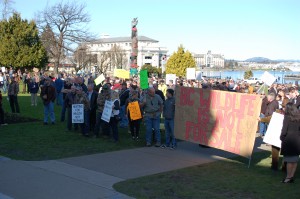 The erosion of hunter’s access to BC game is yet another example of government putting the needs of special interests ahead of those of British Columbians. Hunting is a foundational part of life for many people in BC. As you all know so well, it is way to connect with nature, spend quality time with your loved ones, and provide a clean, healthy source of protein for your families. Having that connection to one’s food, knowing its true value, and appreciating where it came from means that you have a profound understanding of the importance of conservation.
The erosion of hunter’s access to BC game is yet another example of government putting the needs of special interests ahead of those of British Columbians. Hunting is a foundational part of life for many people in BC. As you all know so well, it is way to connect with nature, spend quality time with your loved ones, and provide a clean, healthy source of protein for your families. Having that connection to one’s food, knowing its true value, and appreciating where it came from means that you have a profound understanding of the importance of conservation.
It has been a great honour for me to work closely with the B.C. Wildlife Federation – the province’s largest conservation organization – as I attempted to educate myself on allocation issues over the past few months.
Hunters in B.C. have had a rich history of conservation in our province, working tirelessly to ensure animal populations are healthy, abundant, and that their habitats are protected.
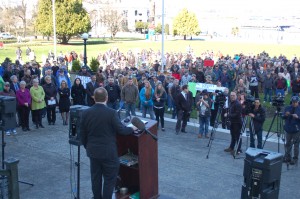 Despite running on a “families first” platform, the BC Liberal government has continued to put the vested interests of a select profitable few ahead of its own residents. In the hunting sector especially, we have seen a steady erosion of your rights as they continue to be reallocated to the guide outfitting industry.
Despite running on a “families first” platform, the BC Liberal government has continued to put the vested interests of a select profitable few ahead of its own residents. In the hunting sector especially, we have seen a steady erosion of your rights as they continue to be reallocated to the guide outfitting industry.
The December hunting permit amendment may have been the straw that broke the camel’s back, so to speak, but the BC government has been making the shift towards prioritizing the needs of industry over its own residents for the last decade.
The government’s actions have not been guided by the values of British Columbians. Nor have they been guided by independent expert advice. The numbers put forward in December weren’t even close to the allocation splits recommended by the ministry.
What troubles me is that according to the lobbyist registrar, the Guide Outfitters Association has had over 2,000 person meetings with government officials since 2011. Quite a number of them included Premier Clark.
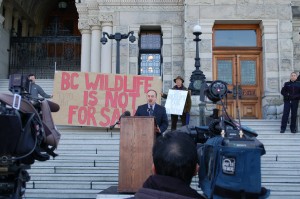 It’s clear that government has an ear to the concerns of guide outfitters.
It’s clear that government has an ear to the concerns of guide outfitters.
But today and together we’re here to say to government that that’s not enough. Together we are demanding that government listen to British Colmbians, the people that they are supposed to represent.
The increased allocation of BC’s wildlife to guide outfitters is an issue that affects all of us, not just the people here today.
I look forward to tabling the BCWF petition opposing the permit allocation amendments shortly. That should help government understand just how many people care about the unfair treatment of resident BC hunters.
I will also be tabling a bill that, if enacted, would make trophy hunting for non-residents more difficult by requiring them to remove the meat from their kills and transport it back to their home address.
For local sustenance hunters – the vast majority of hunters in B.C. – this bill merely echoes what they are already doing; harvesting wild game to bring the meat home to feed themselves and their families. For non-resident trophy hunters coming to B.C. in search of antlers or a hide this poses a larger logistical challenge of exporting large quantities of meat.
It is not a perfect solution to our problems, of course, but it will make the government engage in a conversation about where their interests lie and emphasize the importance of supporting sustainable, respectful hunting practices in our province — practices that are embodied by BC’s resident hunters and the BC Wildlife Federation.
Thank you.
Introduction of the Wildlife Amendment Act
I move introduction of the Wildlife Amendment Act for first reading.
It gives me great pleasure to introduce this bill that, if enacted, would restrict the practices of non-resident trophy hunters who come to B.C. to kill large game by making two specific amendments to the Wildlife Act.
The proposed changes remove grizzly bears from the list of animals exempt from meat harvesting regulations and ensure that all edible portions of animals harvested in B.C. are taken directly to the hunter’s residence.
As the legislation currently stands, the edible parts of big game animals (except cougars, wolves, lynx, bobcats, wolverines, and grizzly bears) must be removed from the animal and packed out to one’s home, or importantly for non-resident hunters, to a meat cutter or a cold storage plant. These last two options provide trophy hunters with legal meat laundering opportunities. By adding “directly or through” to the clause, hunters can still use meat cutters and cold storage plants to process their harvests, but it can’t end there. The meat must make it to their home address. If they want to donate that meat to charity after the fact they are welcome to do so, but they have to take it home first.
Hunters are already required to remove the edible portions from black bears. If enacted, this bill would bring meat harvesting standards for grizzly bears up to the same standard.
British Columbians, and in particular BC resident hunters, support these change. A 2013 McAllister Research poll found that 88% of British Columbians oppose trophy hunting. In addition to that, 95% of hunters said they believe you should not be hunting if you are not prepared to eat what you kill.
For local sustenance hunters – the vast majority of hunters in B.C. – this bill merely echoes what they are already doing; harvesting wild game to bring the meat home to feed their families. For non-resident trophy hunters coming to B.C. to kill an animal only for its hide, skull, or antlers this poses a logistical challenge of exporting large quantities of meat.
I look forward to second reading of the bill.
I move that this bill be placed on the orders of the day for second reading at the next sitting of the House.

